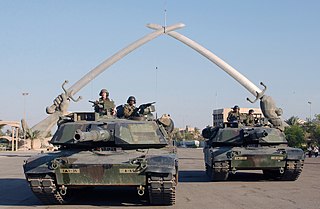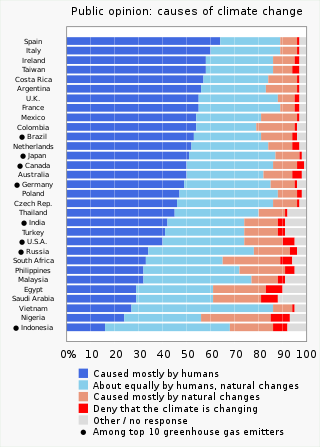Related Research Articles

The North American Free Trade Agreement was an agreement signed by Canada, Mexico, and the United States that created a trilateral trade bloc in North America. The agreement came into force on January 1, 1994, and superseded the 1988 Canada–United States Free Trade Agreement between the United States and Canada. The NAFTA trade bloc formed one of the largest trade blocs in the world by gross domestic product.

The United States public's opinion on the invasion of Iraq has changed significantly since the years preceding the incursion. For various reasons, mostly related to the unexpected consequences of the invasion, as well as misinformation provided by US authorities, the US public's perspective on its government's choice to initiate an offensive is increasingly negative. Before the invasion in March 2003, polls showed 47–60% of the US public supported an invasion, dependent on U.N. approval. According to the same poll retaken in April 2007, 58% of the participants stated that the initial attack was a mistake. In May 2007, the New York Times and CBS News released similar results of a poll in which 61% of participants believed the U.S. "should have stayed out" of Iraq.
An opinion poll, often simply referred to as a survey or a poll, is a human research survey of public opinion from a particular sample. Opinion polls are usually designed to represent the opinions of a population by conducting a series of questions and then extrapolating generalities in ratio or within confidence intervals. A person who conducts polls is referred to as a pollster.
The economic policies of Bill Clinton administration, referred to by some as Clintonomics, encapsulates the economic policies of president of the United States Bill Clinton that were implemented during his presidency, which lasted from January 1993 to January 2001.

In political studies, surveys have been conducted in order to construct historical rankings of the success of the presidents of the United States. Ranking systems are usually based on surveys of academic historians and political scientists or popular opinion. The scholarly rankings focus on presidential achievements, leadership qualities, failures and faults. Popular-opinion polls typically focus on recent or well-known presidents.

Labor unions represent United States workers in many industries recognized under US labor law since the 1935 enactment of the National Labor Relations Act. Their activity today centers on collective bargaining over wages, benefits, and working conditions for their membership, and on representing their members in disputes with management over violations of contract provisions. Larger trade unions also typically engage in lobbying activities and electioneering at the state and federal level.

Public opinion of same-sex marriage in the United States has significantly changed since the 1990s, and an overwhelming majority of Americans now favor same-sex marriage.

This article lists international opinion polls taken in various countries around the world during 2008 relating to the 2008 United States presidential election. Most polls measured foreign preference for Democratic candidate Barack Obama and Republican candidate John McCain. For international reaction to the election, see International reaction to the United States presidential election, 2008.
A 47-nation global survey of public opinion conducted in June 2007 by the Pew Global Attitudes Project found considerable opposition to the NATO military operations in Afghanistan. In 2 out of the 47 countries was there a majority that favoured keeping troops in Afghanistan – Israel (59%) and Kenya (60%). On the other hand, in 41 of the 47 countries pluralities wanted NATO troops out of Afghanistan as soon as possible. In 32 out of 47 countries majorities wanted NATO troops out of Afghanistan as soon as possible. Majorities in 7 out of 12 NATO member countries wanted troops withdrawn as soon as possible.

Public opinion on climate change is the aggregate of attitudes or beliefs held by a population concerning issues relating to "anthropogenic climate change, perceptions of climate change risks, concern about its seriousness, and thoughts on what, if anything, should be done to address it." Public opinion on climate change is related to a broad set of variables, including the effects of sociodemographic, political, cultural, economic, and environmental factors" as well as media coverage and interaction with different news and social media.

Public opinion on nuclear issues is the aggregate of attitudes or beliefs held by the adult population concerning nuclear power, nuclear weapons and uranium mining. Opinions vary very significantly across countries, and have significantly changed over time, with support declining mostly as result of widely publicized nuclear incidents, often presented in a distorted way, where the debate on climate change has boosted support for nuclear power as low-carbon energy source in many countries.
The 2016 United States presidential debates were a series of debates held for the presidential election. The Commission on Presidential Debates (CPD), a bipartisan organization formed in 1987, organized three debates among the major presidential candidates. The first of these presidential debates took place on September 26, 2016, and set the record as the most-watched debate in American history, with 84 million viewers. The second debate took place on October 9, and the third took place on October 19. All CPD debates occurred from approximately 9 p.m. to 10:30 p.m. EDT. Only the Democratic nominee Hillary Clinton and the Republican nominee Donald Trump met the criteria for inclusion in the debates, and thus were the only two to appear in the debates sponsored by the Commission on Presidential Debates. The CPD-sponsored vice presidential debate took place on October 4, 2016. Only Democratic nominee Tim Kaine and Republican nominee Mike Pence appeared in it.

Public opinion on gun control in the United States has been tracked by numerous public opinion organizations and newspapers for more than 20 years. There have also been major gun policies that affected American opinion in the 1990s. Throughout these polling years, there are different gun control proposals that show promise for bipartisan action. Over the years listed there have been mass shootings, most notably school shootings, that have affected public opinion. There have also been a growth in states around the United States taking more drastic measures on gun control.
This article summarizes the results of polls taken during the presidency of Donald Trump which gather and analyze public opinion on his administration's performance and policies.

Communist nostalgia, also called communism nostalgia or socialist nostalgia, is the nostalgia in various post-communist states of Central and Eastern Europe and Russia for the prior communist states.
This is a list of opinion polls taken on the Presidency of Donald Trump in 2018.
This is a list of opinion polls taken on the presidency of Donald Trump in 2019. Polls throughout the year showed that more disapproved of Trump than approved of him, generally by a margin of between five and fifteen percentage points. The polls also showed that the margin may have been stronger or weaker in some states, when compared with the national polls.

Generation Z, colloquially also known as zoomers, is the demographic cohort succeeding Millennials and preceding Generation Alpha. Researchers and popular media use the mid-to-late 1990s as starting birth years and the early 2010s as ending birth years.
Following were the reaction to the Afghanistan War (2001–2021).
References
- ↑ "North American Free Trade Agreement (NAFTA) | United States Trade Representative". ustr.gov. Retrieved 2018-04-23.
- 1 2 3 4 5 6 7 8 "International Trade". www.pollingreport.com. Retrieved 2018-04-23.
- 1 2 Blendon, Robert. "Public Opinion and Trump's Job and Trade Policies". Challenge: 228–244.
- 1 2 3 4 Affairs, Chicago Council on Global. "Pro-Trade Views on the Rise, Partisan Divisions on NAFTA Widen | Chicago Council on Global Affairs". www.thechicagocouncil.org. Retrieved 2018-04-23.
- 1 2 3 4 5 6 7 8 "Americans generally positive about NAFTA, but most Republicans say it benefits Mexico more than U.S." Pew Research Center. 2017-11-13. Retrieved 2018-04-23.
- 1 2 3 4 5 6 7 8 9 10 11 Cohen, Jeffrey E. (1997). Presidential Responsiveness and Public Policy-Making: The Publics and the Policies that Presidents Choose. University of Michigan Press. doi:10.3998/mpub.14952. ISBN 9780472108121. JSTOR 10.3998/mpub.14952.
- 1 2 3 4 5 6 Uslaner, Eric M. (1998). "Trade Winds NAFTA and the Rational Public". Political Behavior. 20 (4): 341–360. doi:10.1023/A:1024847815352. JSTOR 586499. S2CID 145725058.
- 1 2 Aguila, Emma; Akhmedjonov, Alisher R.; Basurto-Davila, Ricardo; Kumar, Krishna B.; Kups, Sarah; Shatz, Howard J. (2012). "U.S. Public Opinion on Immigration and the North American Free Trade Agreement". In Aguila, Emma; Akhmedjonov, Alisher R.; Basurto-Davila, Ricardo; Kumar, Krishna B.; Kups, Sarah; Shatz, Howard J. (eds.). United States and Mexico. Ties That Bind, Issues That Divide (2 ed.). RAND Corporation. pp. 143–148. ISBN 9780833051066. JSTOR 10.7249/mg985rc.23.